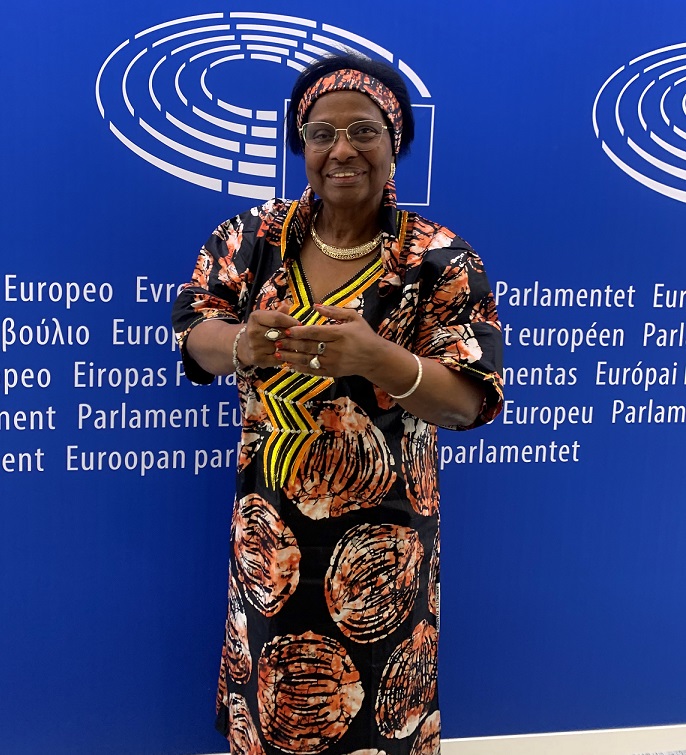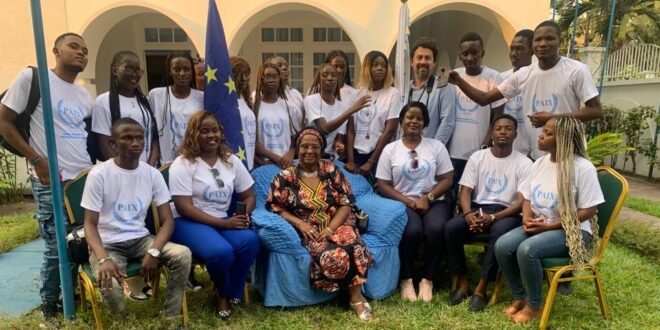Dr Pierrette Herzberger-Fofana, Member of the European Parliament representing Germany on the platform of the Green Party, was recently in Kinshasa, the capital city of the Democratic Republic of Congo to speak to young people. She writes about her impressions of young Congolese and her views on how they can take charge of their homeland’s destiny
—-
By Dr Pierrette Herzberger-Fofana, MEP
The Democratic Republic of Congo (DRC) is a country that was the private property of the Belgian King Leopold II during the colonial period. Eighty times the size of Belgium, it is rich in minerals such as gold, diamond, copper and coltan, which is used to make mobile phones. However, violent clashes between government troops and rebels are taking place in the east of the country.
At the invitation of the organisation “Universal Council for Peace of Nations and Continents” (Culpac), I travelled to the DRC to attend an event devoted to peace and human rights. This organisation helps to promote the participation of young people in society and above all to develop a culture of peace, a guarantee of stability.

The ceremony took place at the Ministry of Foreign Affairs and was attended by more than 300 young people. Young Congolese under the age of 30 represent almost 60% of the Congolese population. They therefore represent a secure and dynamic potential that can take charge of its own destiny and play an active role in building a strong and inclusive nation, where the principle of democracy is the basis of their commitment.
Presidential, regional and local elections will be held in December this year. Around 43 million voters will be called upon to elect the President of the Republic and members of parliament. Young people want to participate in the democratic process.
Indeed, the participation of young people, especially girls, in issues that concern them is one of their fundamental rights, recognised by the United Nations Charter and the African Youth Charter. This charter aims to protect young people from violence and discrimination, and guarantees them freedom of expression, association, religion and other human rights.
Youth empowerment also applies to various programmes of the Congolese government’s National Youth Council. Young people must therefore take ownership of these programmes, as it is their rights that highlight their responsibilities, such as participating in elections.
In today’s world, where more and more wars and conflicts are breaking out, young people must be ambassadors of peace. The generation that banishes violence in its relations with others, the generation that promotes the values of peace to contribute to a tolerant society open to universal values and human rights. Young Congolese men and women aspire to develop their country in order to achieve empowerment and achieve the 2030 Sustainable Development Goals.
It was an opportunity for me to listen to young Congolese people and to learn from them about their hopes and ambitions, with a view to building a relationship based on a renewed partnership between the European Union and Africa.
 THE AFRICAN COURIER. Reporting Africa and its Diaspora! The African Courier is an international magazine published in Germany to report on Africa and the Diaspora African experience. The first issue of the bimonthly magazine appeared on the newsstands on 15 February 1998. The African Courier is a communication forum for European-African political, economic and cultural exchanges, and a voice for Africa in Europe.
THE AFRICAN COURIER. Reporting Africa and its Diaspora! The African Courier is an international magazine published in Germany to report on Africa and the Diaspora African experience. The first issue of the bimonthly magazine appeared on the newsstands on 15 February 1998. The African Courier is a communication forum for European-African political, economic and cultural exchanges, and a voice for Africa in Europe.

































